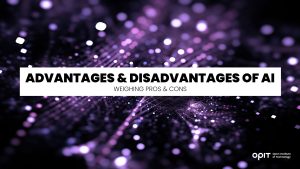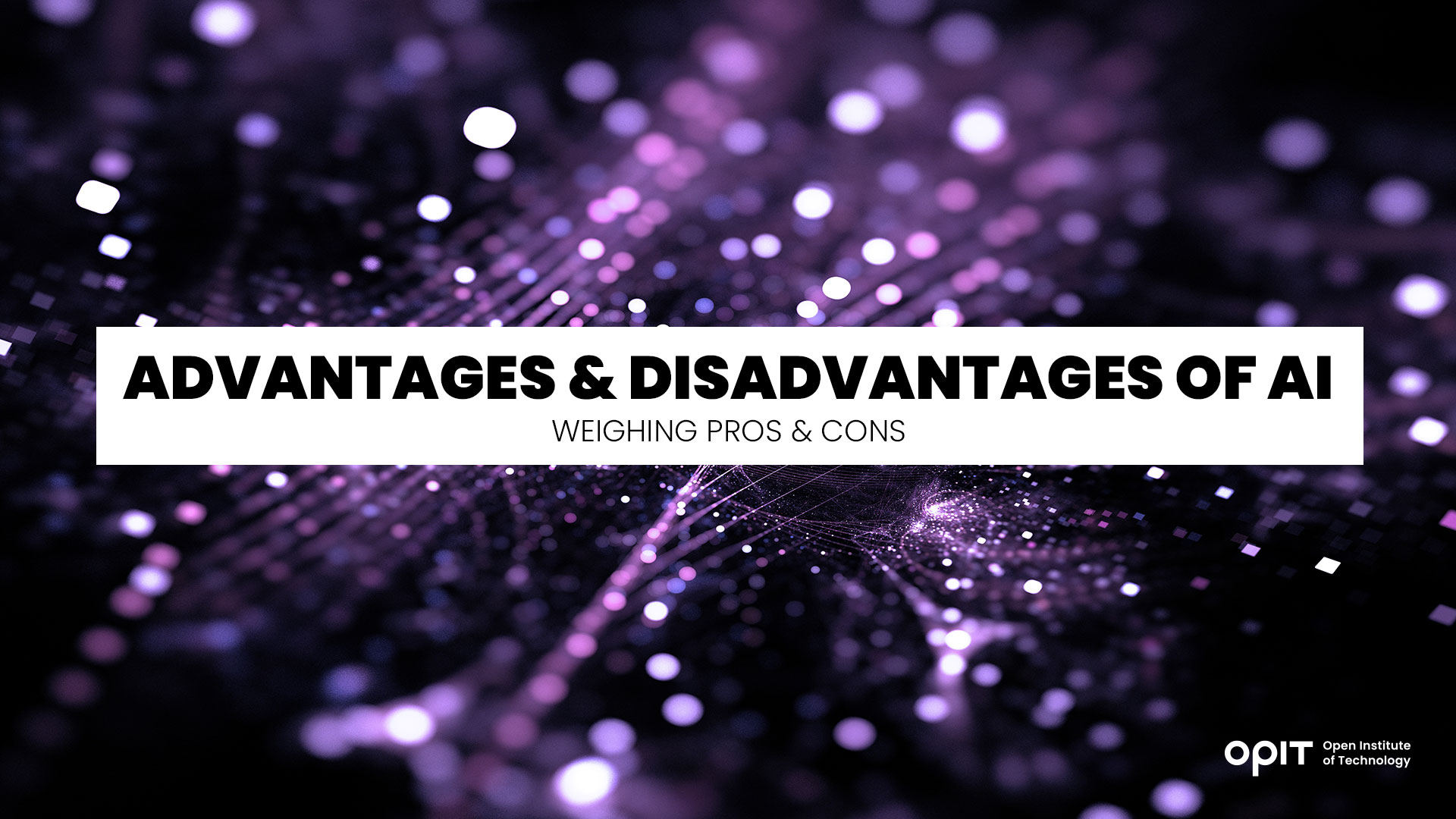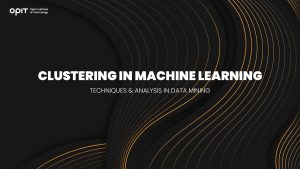Read the full article below (in Italian):


Artificial intelligence has impacted on businesses since its development in the 1940s. By automating various tasks, it increases security, streamlines inventory management, and provides many other tremendous benefits. Additionally, it’s expected to grow at a rate of nearly 40% until the end of the decade.
However, the influence of artificial intelligence goes both ways. There are certain disadvantages to consider to get a complete picture of this technology.
This article will cover the most important advantages and disadvantages of artificial intelligence.
Advantages of AI
Approximately 37% of all organizations embrace some form of AI to polish their operations. The numerous advantages help business owners take their enterprises to a whole new level.
Increased Efficiency and Productivity
One of the most significant advantages of artificial intelligence is elevated productivity and efficiency.
Automation of Repetitive Tasks
How many times have you thought to yourself: “I really wish there was a better way to take care of this mundane task.” There is – incorporate artificial intelligence into your toolbox.
You can program this technology to perform basically anything. Whether you need to go through piles of documents or adjust print settings, a machine can do the work for you. Just set the parameters, and you can sit back while AI does the rest.
Faster Data Processing and Analysis
You probably deal with huge amounts of information. Manual processing and analysis can be time-consuming, but not if you outsource the project to AI. Artificial intelligence can breeze through vast chunks of data much faster than people.
Improved Decision-Making
AI makes all the difference with decision-making through data-driven insights and the reduction of human error.
Data-Driven Insights
AI software gathers and analyzes data from relevant sources. Decision-makers can use this highly accurate information to make an informed decision and predict future trends.
Reduction of Human Error
Burnout can get the better of anyone and increase the chances of making a mistake. That’s not what happens with AI. If correctly programmed, it can carry out virtually any task, and the chances of error are slim to none.
Enhanced Customer Experience
Artificial intelligence can also boost customer experience.
Personalized Recommendations
AI machines can use data to recommend products and services. The technology reduces the need for manual input to further automate repetitive tasks. One of the most famous platforms with AI-based recommendations is Netflix.
Chatbots and Virtual Assistants
Many enterprises set up AI-powered chatbots and virtual assistants to communicate with customers and help them troubleshoot various issues. Likewise, these platforms can help clients find a certain page or blog on a website.
Innovation and Creativity
Contrary to popular belief, one of the biggest advantages of artificial intelligence is that it can promote innovation and creativity.
AI-Generated Content and Designs
AI can create some of the most mesmerizing designs imaginable. Capable of producing stunning content, whether in the written, video, or audio format, it also works at unprecedented speeds.
Problem-Solving Capabilities
Sophisticated AI tools can solve a myriad of problems, including math, coding, and architecture. Simply describe your problem and wait for the platform to apply its next-level skills.
Cost Savings
According to McKinsey & Company, you can decrease costs by 15%-20% in less than two years by implementing AI in your workplace. Two main factors underpin this reduction.
Reduced Labor Costs
Before AI became widespread, many tasks could only be performed by humans, such as contact management and inventory tracking. Nowadays, artificial intelligence can take on those responsibilities and cut labor costs.
Lower Operational Expenses
As your enterprise becomes more efficient through AI implementation, you reduce errors and lower operational expenses.
Disadvantages of AI
AI does have a few drawbacks. Understanding the disadvantages of artificial intelligence is key to making the right decision on the adoption of this technology.
Job Displacement and Unemployment
The most obvious disadvantage is redundancies. Many people lose their jobs because their position becomes obsolete. Organizations prioritize cost cutting, which is why they often lay off employees in favor of AI.
Automation Replacing Human Labor
This point is directly related to the previous one. Even though AI-based automation is beneficial from a time and money-saving perspective, it’s a major problem for employees. Those who perform repetitive tasks are at risk of losing their position.
Need for Workforce Reskilling
Like any other workplace technology, artificial intelligence requires people to learn additional skills. Since some abilities may become irrelevant due to AI-powered automation, job seekers need to pick up more practical skills that can’t be replaced by AI.
Ethical Concerns
In addition to increasing unemployment, artificial intelligence can also raise several ethical concerns.
Bias and Discrimination in AI Algorithms
AI algorithms are sophisticated, but they’re not perfect. The main reason being that developers inject their personal biases into the AI-based tool. Consequently, content and designs created through AI may contain subjective themes that might not resonate with some audiences.
Privacy and Surveillance Issues
One of the most serious disadvantages of artificial intelligence is that it can infringe on people’s privacy. Some platforms gather information about individuals without their consent. Even though it may achieve a greater purpose, many people aren’t willing to sacrifice their right to privacy.
High Initial Investment and Maintenance Costs
As cutting-edge technology, Artificial Intelligence is also pricey.
Expensive AI Systems and Infrastructure
The cost of developing a custom AI solution can be upwards of $200,000. Hence, it can be a financial burden.
Ongoing Updates and Improvements
Besides the initial investment, you also need to release regular updates and improvements to streamline the AI platform. All of which quickly adds up.
Dependence on Technology
While reliance on technology has its benefits, there are a few disadvantages.
Loss of Human Touch and Empathy
Although advanced, most AI tools fail to capture the magic of the human touch. They can’t empathize with the target audience, either, making the content less impactful.
Overreliance on AI Systems
If you become overly reliant on an AI solution, your problem-solving skills suffer and you might not know how to complete a project if the system fails.
Security Risks
AI tools aren’t impervious to security risks. Far from it – many risks arise when utilizing this technology.
Vulnerability to Cyberattacks
Hackers can tap into the AI network by adding training files the tool considers safe. Before you know it, the malware spreads and wreaks havoc on the infrastructure.
Misuse of AI Technology
Malicious users often have dishonorable intentions with AI software. They can use it to create deep fakes or execute phishing attacks to steal information.
AI in Various Industries: Pros and Cons
Let’s go through the pros and cons of using AI in different industries.
Healthcare
Advantages:
- Improved Diagnostics – AI can drastically speed up the diagnostics process.
- Personalized Treatment – Artificial intelligence can provide personalized treatment recommendations.
- Drug Development – AI algorithms can scan troves of information to help develop drugs.
Disadvantages:
- Privacy Concerns – Systems can collect patient and doctor data without their permission.
- High Costs – Implementing an AI system might be too expensive for many hospitals.
- Potential Misdiagnosis – An AI machine may overlook certain aspects during diagnosis.
Finance
Advantages:
- Fraud Detection – AI-powered data collection and analysis is perfect for preventing financial fraud.
- Risk Assessment – Automated reports and monitoring expedite and optimize risk assessment.
- Algorithmic Trading – A computer can capitalize on specific market conditions automatically to increase profits.
Disadvantages:
- Job Displacement – Risk assessment professionals and other specialists could become obsolete due to AI.
- Ethical Concerns – Artificial intelligence may use questionable data collection practices.
- Security Risks – A cybercriminal can compromise an AI system of a bank, allowing them to steal customer data.
Manufacturing
Advantages:
- Increased Efficiency – You can set product dimensions, weight, and other parameters automatically with AI.
- Reduced Waste – Artificial intelligence is more accurate than humans, reducing waste in manufacturing facilities.
- Improved Safety – Lower manual input leads to fewer workplace accidents.
Disadvantages:
- Job Displacement – AI implementation results in job loss in most fields. Manufacturing is no exception.
- High Initial Investment – Production companies typically need $200K+ to develop a tailor-made AI system.
- Dependence on Technology – AI manufacturing programs may require tweaks after some time, which is hard to do if you become overly reliant on the software.
Education
Advantages:
- Personalized Learning – An AI program can recommend appropriate textbooks, courses, and other resources.
- Adaptive Assessments – AI-operated systems adapt to the learner’s needs for greater retention.
- Virtual Tutors – Schools can reduce labor costs with virtual tutors.
Disadvantages:
- Privacy Concerns – Data may be at risk in an AI classroom.
- Digital Divide – Some nations don’t have the same access to technology as others, leading to so-called digital divide.
- Loss of Human Interaction – Teachers empathize and interact with their learners on a profound level, which can’t be said for AI.
AI Is Mighty But Warrants Caution
People rely on AI for higher efficiency, productivity, innovation, and automation. At the same time, it’s expensive, raises unemployment, and causes many privacy concerns.
That’s why you should be aware of the advantages and disadvantages of artificial intelligence. Striking a balance between the good and bad sides is vital for effective yet ethical implementation.
If you wish to learn more about AI and its uses across industries, consider taking a course by renowned tech experts.
Related posts

Source:
- Agenda Digitale, published on June 16th, 2025
By Lokesh Vij, Professor of Cloud Computing Infrastructure, Cloud Development, Cloud Computing Automation and Ops and Cloud Data Stacks at OPIT – Open Institute of Technology
NIST identifies five key characteristics of cloud computing: on-demand self-service, network access, resource pooling, elasticity, and metered service. These pillars explain the success of the global cloud market of 912 billion in 2025

You’ve probably seen two of the most recent popular social media trends. The first is creating and posting your personalized action figure version of yourself, complete with personalized accessories, from a yoga mat to your favorite musical instrument. There is also the Studio Ghibli trend, which creates an image of you in the style of a character from one of the animation studio’s popular films.
Both of these are possible thanks to OpenAI’s GPT-4o-powered image generator. But what are you risking when you upload a picture to generate this kind of content? More than you might imagine, according to Tom Vazdar, chair of cybersecurity at the Open Institute of Technology (OPIT), in a recent interview with Wired. Let’s take a closer look at the risks and how this issue ties into the issue of responsible artificial intelligence.
Uploading Your Image
To get a personalized image of yourself back from ChatGPT, you need to upload an actual photo, or potentially multiple images, and tell ChatGPT what you want. But in addition to using your image to generate content for you, OpenAI could also be using your willingly submitted image to help train its AI model. Vazdar, who is also CEO and AI & Cybersecurity Strategist at Riskoria and a board member for the Croatian AI Association, says that this kind of content is “a gold mine for training generative models,” but you have limited power over how that image is integrated into their training strategy.
Plus, you are uploading much more than just an image of yourself. Vazdar reminds us that we are handing over “an entire bundle of metadata.” This includes the EXIF data attached to the image, such as exactly when and where the photo was taken. And your photo may have more content in it than you imagine, with the background – including people, landmarks, and objects – also able to be tied to that time and place.
In addition to this, OpenAI also collects data about the device that you are using to engage with the platform, and, according to Vazdar, “There’s also behavioral data, such as what you typed, what kind of image you asked for, how you interacted with the interface and the frequency of those actions.”
After all that, OpenAI knows a lot about you, and soon, so could their AI model, because it is studying you.
How OpenAI Uses Your Data
OpenAI claims that they did not orchestrate these social media trends simply to get training data for their AI, and that’s almost certainly true. But they also aren’t denying that access to that freely uploaded data is a bonus. As Vazdar points out, “This trend, whether by design or a convenient opportunity, is providing the company with massive volumes of fresh, high-quality facial data from diverse age groups, ethnicities, and geographies.”
OpenAI isn’t the only company using your data to train its AI. Meta recently updated its privacy policy to allow the company to use your personal information on Meta-related services, such as Facebook, Instagram, and WhatsApp, to train its AI. While it is possible to opt-out, Meta isn’t advertising that fact or making it easy, which means that most users are sharing their data by default.
You can also control what happens with your data when using ChatGPT. Again, while not well publicized, you can use ChatGPT’s self-service tools to access, export, and delete your personal information, and opt out of having your content used to improve OpenAI’s model. Nevertheless, even if you choose these options, it is still worth it to strip data like location and time from images before uploading them and to consider the privacy of any images, including people and objects in the background, before sharing.
Are Data Protection Laws Keeping Up?
OpenAI and Meta need to provide these kinds of opt-outs due to data protection laws, such as GDPR in the EU and the UK. GDPR gives you the right to access or delete your data, and the use of biometric data requires your explicit consent. However, your photo only becomes biometric data when it is processed using a specific technical measure that allows for the unique identification of an individual.
But just because ChatGPT is not using this technology, doesn’t mean that ChatGPT can’t learn a lot about you from your images.
AI and Ethics Concerns
But you might wonder, “Isn’t it a good thing that AI is being trained using a diverse range of photos?” After all, there have been widespread reports in the past of AI struggling to recognize black faces because they have been trained mostly on white faces. Similarly, there have been reports of bias within AI due to the information it receives. Doesn’t sharing from a wide range of users help combat that? Yes, but there is so much more that could be done with that data without your knowledge or consent.
One of the biggest risks is that the data can be manipulated for marketing purposes, not just to get you to buy products, but also potentially to manipulate behavior. Take, for instance, the Cambridge Analytica scandal, which saw AI used to manipulate voters and the proliferation of deepfakes sharing false news.
Vazdar believes that AI should be used to promote human freedom and autonomy, not threaten it. It should be something that benefits humanity in the broadest possible sense, and not just those with the power to develop and profit from AI.
Responsible Artificial Intelligence
OPIT’s Master’s in Responsible AI combines technical expertise with a focus on the ethical implications of AI, diving into questions such as this one. Focusing on real-world applications, the course considers sustainable AI, environmental impact, ethical considerations, and social responsibility.
Completed over three or four 13-week terms, it starts with a foundation in technical artificial intelligence and then moves on to advanced AI applications. Students finish with a Capstone project, which sees them apply what they have learned to real-world problems.
Have questions?
Visit our FAQ page or get in touch with us!
Write us at +39 335 576 0263
Get in touch at hello@opit.com
Talk to one of our Study Advisors
We are international
We can speak in:

